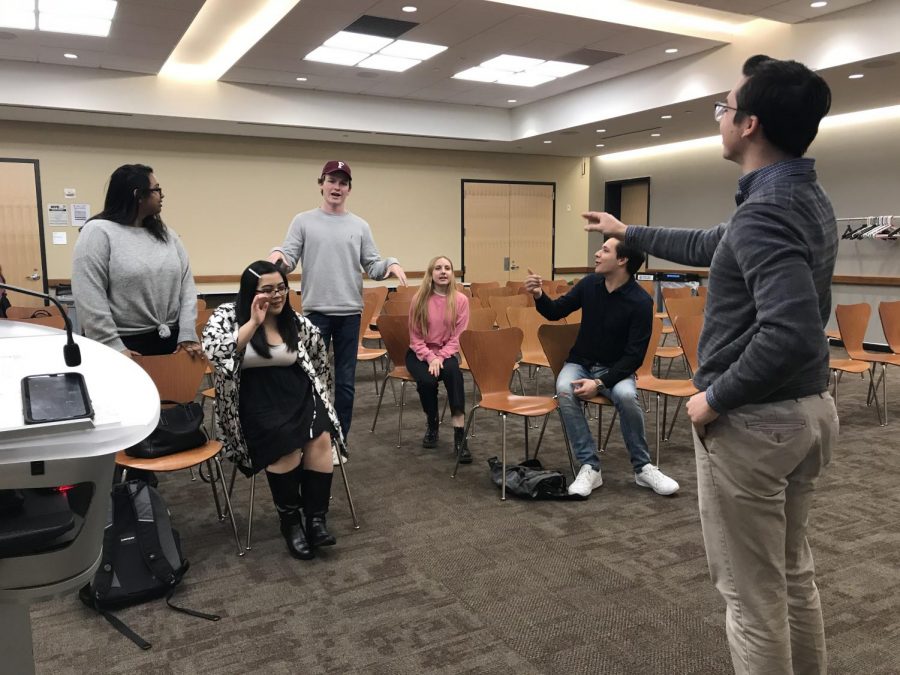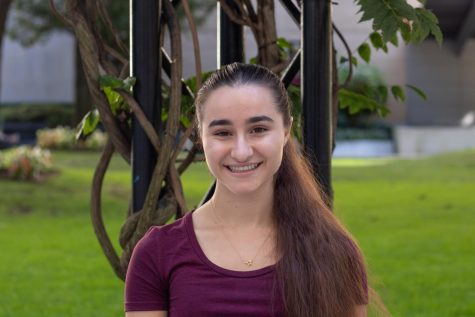Lack of Student Involvement Causes Town Hall Concerns
USG Vice President Robert Stryczek talks to students about their concerns at the second town hall meeting.
March 3, 2020
At the second town hall meeting of the year hosted by Fordham Lincoln Center’s United Student Government (USG), nine students gathered in a large room to discuss students’ lack of interest in club events, limited space for an influx of student clubs and the opening of a new Fordham facility.
Struggles With Student Apathy
The low attendance at the town hall meeting on Wednesday, Feb. 26, was reflective of that latter issue, which was a concern for many of the meeting’s attendees.
“All clubs struggle with membership and retention,” said Chair of Student Affairs Loreen Ruiz, Fordham College at Lincoln Center (FCLC) ’21. “I think it’s a product of just having fewer people at this campus and having access to more immediate, non-academic opportunities that they choose to pursue, instead of being involved in clubs.”
The issue of low student attendance at club meetings would not be apparent from the number of clubs that FCLC offers; this semester alone, Lincoln Center reached over 60 clubs by adding or reviving Chess Club, Wavelengths at Lincoln Center, Podcast & Blog Writing Club, Deaf Education & American Sign Language (DEASL), and Feminist Alliance to the already large number of groups offered at campus.
Rachana Komatireddy, FCLC ’22, chair of operations, said she hopes that the more niche clubs that were recently revived or created will encourage more students to become involved with clubs and events around campus.
Yet, President Pro Tempore Sajani Patel, FCLC ’22, has concerns that the high number of clubs offered on campus may be a hindrance to the visibility of club events happening on campus.. When students are walking by the bulletin boards positioned around campus, “there is so much information on one thing, it is hard for people to even want to look at it,” she said.
Tina Thermadam, FCLC ’20 and president of USG, suggested collaboration among clubs as a solution to clubs feeling they lack numbers at their initiatives.
“It’s that much more enjoyable and powerful when you are able to collaborate with other clubs to be able to make those events because that means you have more likelihood of space and funding for your event to be at the scale that you want it to be,” she said.
USG is also looking into transitioning platforms from OrgSync, the online student activities portal that Fordham uses to manage different clubs and events around campus, to another system yet to be determined, hoping it will increase visibility for clubs, according to Thermadam.
“I remember when I first came to Fordham and tried to navigate OrgSync,” Patel said. “I don’t know if it was that the information was wrong or it was just confusing because there was too much, but it was difficult.”
More Clubs Than Space
Amongst concerns about visibility for clubs on campus, another issue the town hall attendees mentioned was having too many clubs and not enough space.
“Lincoln Center is a pretty tiny space,” Komatireddy said. Komatireddy is a part of USG’s Operations Committee. She mentioned that an added challenge to her role this year, with the influx of new clubs, has been figuring out how each club will find space to hold their regular meetings and events.
“You want clubs to be able to stand out and for students to come, and you want clubs to have a good amount of members. So for us, it’s about balancing that and making sure every club gets what they need,” she said.
According to Komatireddy, USG hasn’t received complaints from students about their clubs lacking space. Thermadam explained that that may be because complaints from clubs about their scheduling and room reservations get handled by the Office of Student Involvement, and they often don’t reach USG.
Yoga & Mindfulness member Maia Nunez, FCLC ’22, said there have been issues with booking space for the Yoga & Mindfulness club this semester. According to Nunez, there have been two occasions when the club’s usual spot was booked by another event and the Office of Student Involvement didn’t inform them until it was too late.
Beyond reserving rooms for club events, there are also graduate classes in the evening that hold hierarchy over club meetings, which adds an extra layer of difficulty for scheduling club events, Komatireddy said.
Field Opens at Lincoln Center for Intramural Sports
As a way to open up more accessible space to student clubs, USG received permission to utilize the property next to Fordham Lincoln Center on the corner of 10th Avenue and 61st Street.
Chair of Facilities Robert Sundstrom, FCLC ’22, said that the field is going to be available starting after spring break for clubs to rent out.
“One of the main things we’re missing (at Lincoln Center) is intramural sports,” Riley Higgins, FCLC ’23, said. “The opening of the field will hopefully help with that.”
Lincoln Center students involved in intramural sports have traditionally had to travel to the Rose Hill campus in order to participate in their sport since Lincoln Center doesn’t have the facilities to provide space for it.
Ethan Sacco, FCLC ’23, is a part of the intramural basketball team at Rose Hill. He said that all of their games have been at 10 or 11 p.m., requiring him to commute to and from Rose Hill, often not getting back until after 1 a.m. This is an inconvenience, especially on the days he has an 8:30 a.m. class the next morning, he said.
Having played sports all throughout high school, he said, “It was a tough transition to not be able to continue to keep playing even at just a local pick-up level.”
The acquired field is not very large and there are still some security measures that need to be addressed in order to allow it to become usable to students. “Right now, the main problem is the fence — it is not very high at all, so it’s difficult to imagine doing something like flag football, soccer, or kickball,” Sundstrom said.
USG is currently trying to have golf netting added around the top of the fence to expand its versatility.
At the end of the meeting, the group members each went around and acknowledged the aspects of Fordham University that they appreciate. A recurring theme was the amount of people at Fordham that actually care about the well-being of students and the college.
“Fordham actually listens,” Thermadam said. From her experience as president, she said she has learned firsthand how Fordham staff members are willing to listen to student concerns.
“You can give them even the tiniest thing that is wrong with the campus and they will try to see how they can fix it,” she said.











